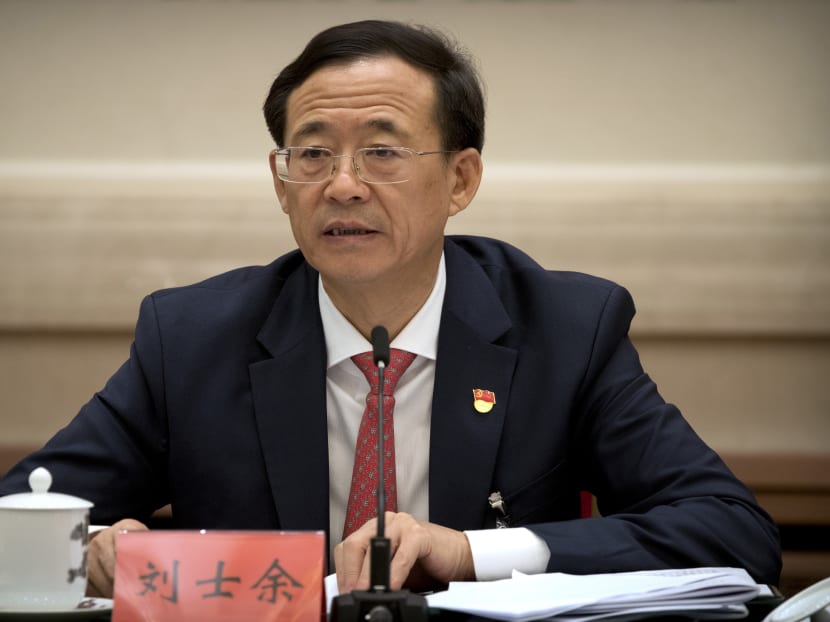Fallen politician plotted against leaders: Chinese official
BEIJING — A senior figure in China's ruling Communist Party has accused a dismissed regional leader of plotting to “usurp party leadership”, adding to accusations against the former rising star.

Mr Liu Shiyu, chairman of the China Securities Regulatory Commission. Mr Liu on Thursday (Oct 19) accused the former party secretary of Chongqing, Sun Zhengcai, of plotting a coup against the party leadership in the clearest explanation yet of the abrupt firing of the former rising star. Photo: AP
BEIJING — A senior figure in China's ruling Communist Party has accused a dismissed regional leader of plotting to “usurp party leadership”, adding to accusations against the former rising star.
Sun Zhengcai was dismissed in July as party leader in the western megacity of Chongqing and was among other disgraced former officials cited by the chairman of China's securities regulator as corrupt and plotting to seize power.
Sun had previously been accused of “grave violations of discipline,” a vague phrase that can include corruption or disloyalty to the party. But the accusation that he had plotted a political overthrow represents a personalisation of the allegations: Rather than attempting to undermine the party, he is accused of transgressions against China’s leader, Xi Jinping.
Sun and other senior figures prosecuted in a marathon anti-graft crackdown were “great not just in venality and corruption but in conspiring openly to usurp party leadership”, regulatory chairman Liu Shiyu said on Thursday (Oct 19) at a panel of finance officials.
He was the first senior official to accuse Sun of trying to usurp the party’s leadership.
Mr Liu also mentioned Bo Xilai, another former Chongqing party chief; Zhou Yongkang, a retired member of the ruling party's Standing Committee, the country's inner circle of power; and Guo Boxiong, a former general.
“They had high positions and great power in the party, but they were hugely corrupt and plotted to usurp the party’s leadership and seize state power,” the South China Morning Post (SCMP) quoted Mr Liu as saying.
“These cases are appalling,” Mr Liu added.
Bo, Zhou and Guo are serving life prison terms after being convicted of corruption or other misconduct.
Mr Liu added that the crackdown led by President Xi since he took power in 2012 that has snared officials and managers of state companies helped to rescue the nation.
“Xi Jinping, with the historical responsibility as a proletarian revolutionist ... cleared up huge risks for the party and the country,” Mr Liu said, according to SCMP.
“We eliminated this huge hidden danger to the party and the nation,” he added. “The party leadership with Xi Jinping as its core have during this five years saved the party, saved the military and saved the nation, and from a global scope, also saved socialism."
Defining their crimes as offences not just against the law and the Communist Party but an attempt to oust Mr Xi himself is a noteworthy shift, analysts say. And making such a statement during the party congress sends a clear message to officials.
“Anyone challenging Xi Jinping can now be seen as committing a political crime,” said Nicholas Bequelin, East Asia regional director for Amnesty International.
“I think that is very different from what everybody understood before — that yes, if you were resisting, opposing or going through bureaucratic strategies to get around new directions you could be taken down by a number of accusations, including corruption or a serious breach of discipline, but not accused of something that is far more serious, which is a political plot.”
One of the accusations against Sun — trying to “usurp the leadership of the party and seize power” — has historical significance from a high-profile purge that followed the death of Mao Zedong.
It was used against the Gang of Four, the officials, including Mao’s last wife, who were arrested in 1976 and blamed for the excesses of the Cultural Revolution.
China’s top graft-buster Wang Qishan and the man widely regarded as the country’s second most powerful man had reportedly said in late 2016 that some cadres tried to take over the party leadership.
“More seriously, some even sought to ... seize party and state power, engaging in activities to split the party, and seriously threatening the nation’s political stability,” state media People’s Daily quoted Mr Wang as saying. AGENCIES





